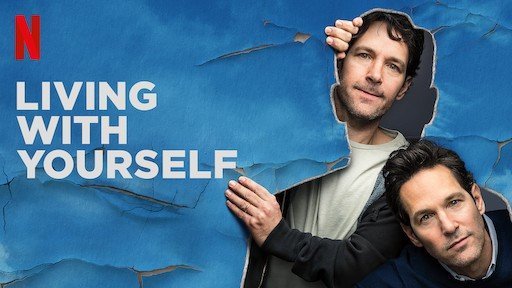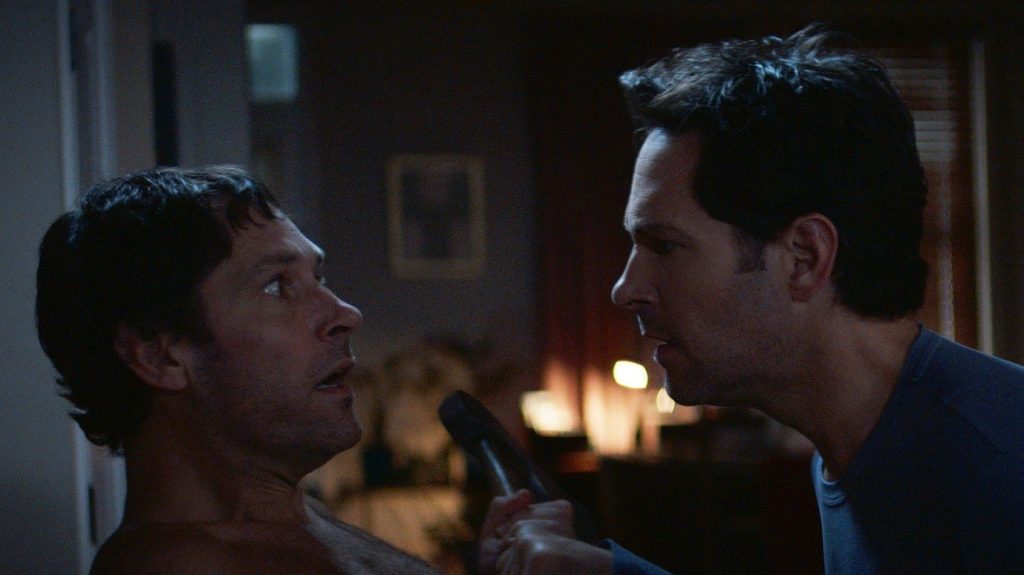Imagine you woke up one day and came face-to-face with a cloned version of yourself – only smarter, more successful, more liked. Overall, just better. Not easy to deal with, we promise!
What’s it About?

An American comedy-drama series created by Timothy Greenberg, Living with Yourself premiered on Netflix in October 2019, and the best part? Two of Paul Rudd’s. I mean, who wouldn’t want to see that? Just in case you needed to be reminded, remember Mike? Phoebe’s equanimous, charming fiancé from Friends? Yup, that’s him!
Living with Yourself features Paul Rudd as the overwhelmingly wearied Miles Elliot, a married, thirty-something copywriter who is pretty much burned out. His life is found to be comfortable, almost too comfortable – and thereby, unstimulating and vapid.
Storyline/Plot

After being referred to by his friend, Dan (Desmin Borges), Miles visits a dingy, eerie-looking spa that promises their clients a ‘DNA cleanse’ of sorts where they are left with only the best genetic material after it’s over. In hopes of re-inventing his discontent self and broken spirit, he indulges.
What he was not told by the people at the spa, however, is that there is no way to make this happen without first killing his original, unimproved self and then using his DNA to create the new, perfect Miles. This cellular cleanse should result in new Miles having all of the original Miles’s memories, down to the most trivial things – so that all he has to do is wake up as the flawless Miles and go about his life as per usual.
Unfortunately, they screw up big time, and original Miles wakes up – (after being buried in the forest) lost, and befuddled only to find the new Miles in HIS home, with HIS wife.
What’s Different?

The new Miles doesn’t look astronomically different, though- and that’s where Rudd’s incredible acting deserves credit. Miles Part II stands taller, appears discernably more confident, and can stir every listener’s interest with his remarkable storytelling skills. His exuberant self – embodies – quite literally, everything that old Miles aspires to be. In comparison, old Miles is scruffy – with eyes that look fatigued and a somber face. In several scenes where the two interact with each other, besides the tech/editing sorcery, the dynamics between the two wildly contrasting spirits are remarkable, and to think that it is just one Paul Rudd physically playing both blows my mind.
Aisling Bea plays Miles’s wife, Kate. She plays a rather vital character in that the series takes its time to give us a good taste of the relationship she shares with Miles and to additionally see things from her perspective as the show progresses. While the unspoken tension emerging from their fertility issues and their not-so-great sex life between her and (old) Miles only becomes increasingly palpable, she is justifiably bewildered, but also impressed with the new and improved Miles. All this makes Miles only feel much worse, eclipsed by this fitter, effervescent version of himself. It’s refreshing to see her being given a narrative entirely independent of Miles, an identity of a fierce woman who can stand up for herself, as opposed to being portrayed as simply a peripheral character that simply waits until her husband gets his sh*t together.
The show has much of its comedic moments during the confrontational scenes between the two, but it also entails much more of a dramatic, philosophical essence to it. Having always envisioned what his life would be like if he just wasn’t tied down by well, himself, what happens when his wish becomes reality? Him getting cloned allows Miles to explore this very reverie, and he soon realizes that it may not be all that fanciful. While Kate finds herself charmed by Miles II, there’s one thing he’s not perfect at – their wedding dance choreography. And when she’s able to revisit it with the original Miles in Episode 7, it serves as a comforting sign that maybe their connection isn’t entirely unsalvageable, a subliminal metaphor for them still ‘being in sync’. In the end, she realizes she can’t survive without either versions of Miles, that his imperfections are equally essential to who he is as a person, that being flawlessly perfect is overrated. In the last episode entailing a tireless tussle between the Miles’s, there is reconciliation, acceptance, and Kate announcing her pregnancy.
Final Words
Living with Yourself wants to tell its viewers that as much as we would love to be humans bereft of imperfections, you have to live with both. And more than that, you’ve got to embrace both. Why the series never achieved mainstream success, I’m not sure, but it’s surely deserving of so much more. I’m certain you won’t disagree after you’ve watched it!
